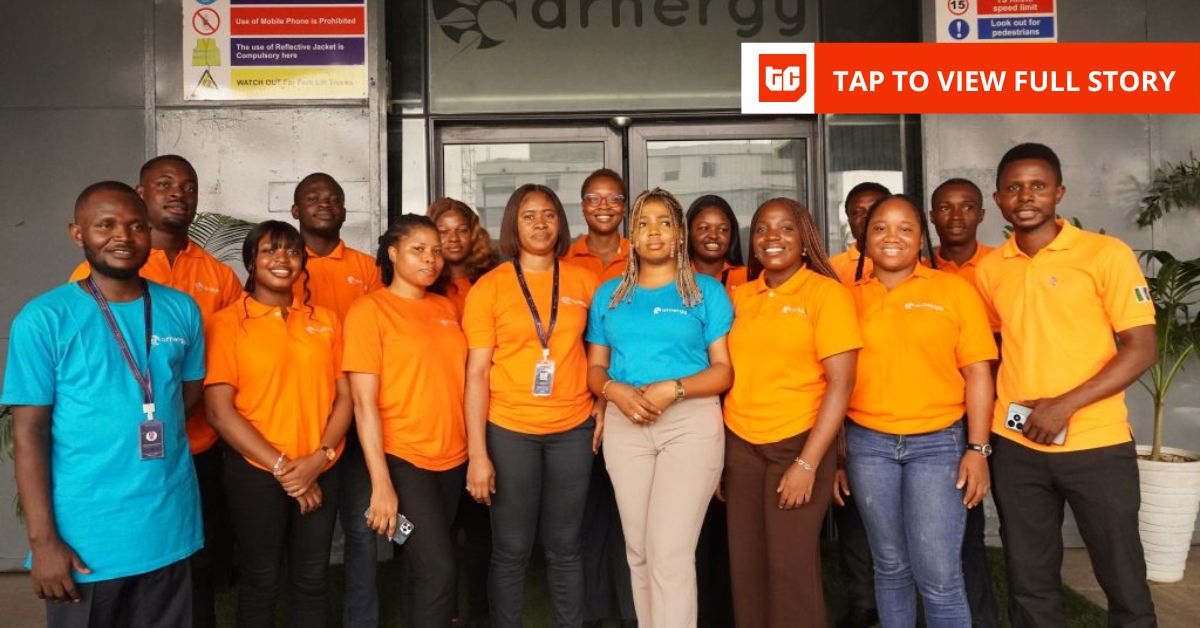Two months before Arnergy, a Nigerian solar energy startup, raised an additional $15 million in April 2025 to complete its $18 million Series B round, current and former employees received an email outlining how to sell their shares back to the company.
It was an unexpected liquidity event that earned millions of naira after selling part of their shares, four employees told , who declined to disclose specific figures for privacy reasons.
“When I left, I knew I had stock options, and I knew the plan was that once a Series B raise happened, I would receive value for them. A few weeks ago, I got a call that Series B had happened, and I’d be receiving something,” Ololade George-Aremu, Arnergy’s former vice president of people and culture, who made almost $2,000, told .
Arnergy introduced stock options in 2019 for employees who committed to staying with the company for the four-year vesting period as a way to encourage long-term commitment. It also used stock options to reward exceptional performers regardless of tenure.
At the time, it was a rare feat for a Nigerian company. Just a year later, Paystack’s $200 million sale to Stripe allowed early employees to turn their stocks into cash and shares in Stripe, creating one of the largest liquidity events in Nigeria’s tech industry.
Offering employee shares is a longstanding Silicon Valley tradition, and several startups, like Airbnb in 2020, have famously created wealth for employees through liquidity events. Such events typically occur during later-stage funding rounds, acquisitions, or IPOs. At earlier stages, like Series A or B rounds, liquidity is usually reserved for executives and investors, making Arnergy’s liquidity event unusual since non-executive employees could cash out part of their shares.
“I’ve heard of equity at companies like Google or Microsoft, but I never thought it would happen here in Nigeria. It’s eye-opening. I’ve never worked at a Nigerian company that did this,” Olayinka Azeez, a five-year senior creative designer at Arnergy who made between $1,500 and $2,000, told .
Azeez was not alone in his disbelief; even George-Aremu, who helped design the company’s stock option plan in 2019, was surprised when she got the email. “I was honestly shocked. It felt like, ‘Wow, this thing worked.’ It completely shifted my mindset,” George-Aremu, who now teaches at the University of Leicester, said.
Having worked in human resources at other Nigerian companies, stock options weren’t new to her, but seeing follow-through was. She only believed in Arnergy’s plan because of CEO Femi Adeyemo’s optimism about the impact shares could have on employees.
“It was important to send a clear message to the ecosystem: when Arnergy makes a promise, we honour it,” Adeyemo told . “ We go the extra mile and even fight for it. As CEO, it was critical for me to ensure that, as part of our capital raise, we made room for liquidity for the employees who rolled up their sleeves to help us reach this milestone. It’s our way of saying your work matters, and so should your reward.”
To build trust, he and George-Aremu worked closely with trustees, the board of directors, and employees, ensuring everyone understood the stock options were genuine. Arnergy even hired a labour consultant to clarify the details.
Not everyone who received a payout has worked at Arnergy as long as Azeez or George-Aremu. Princess Okuoniye, a regional sales manager, joined only two years before the liquidity event. ‘It was a performance-based offer, and it was exciting. I wasn’t even expecting to own shares,” she said.
Though her payout was only hundreds of dollars, it was deeply meaningful to her. “Given how the economy is right now, getting cash for something you didn’t expect is a big deal.”
Arnergy’s liquidity event could not have been more timely for its employees. Nigeria’s headline inflation hit 24.23% in March 2025, primarily driven by seasonal food demand, FX volatility, and higher telecom and logistics costs.
“I decided to sell because I needed the money,” Folashade Adefiranye, a three-year employee who sold 500 shares, a third of her holdings, for less than $1,000, told .
Yet despite the temptation to cash out completely, none of the employees sold all their shares. Each employee who spoke with expressed confidence in Arnergy’s continued growth and the potential for future gains. The company has sold over 1,800 solar systems across Nigeria, with its customer base tripling between 2023 and 2024. Arnergy projects that its customer base and naira-denominated revenue will quadruple in 2025.
Across all four employees spoke to, one thing stood out: the sense of ownership that equity had created. They all spoke of feeling invested emotionally and financially in Arnergy’s success. For some, it’s a reason to stay and double down on the company’s growth. For others, it’s a signal that startups in Nigeria can build real wealth, not just for founders and investors, but for those who help build the company day to day.
“This has changed how I evaluate job offers now,” Azeez said. “If you’re not offering equity or if I can’t understand your plan for it, I won’t take the job.”










